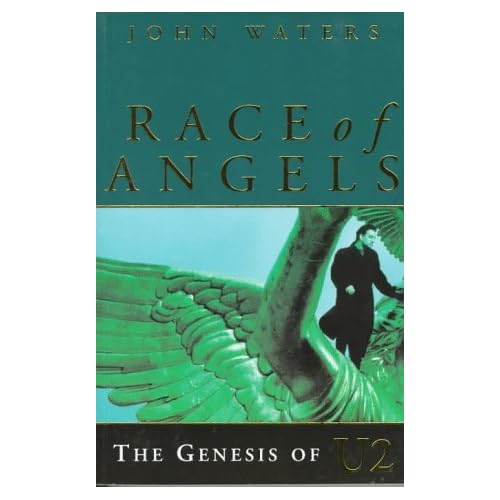Race of Angels: The Genesis of U2
Category: Books,Arts & Photography,Music
Race of Angels: The Genesis of U2 Details
From Publishers Weekly This is not a celebrity bio like Bill Flanagan's recent warts-and-all U2: At the End of the World. Instead, Irish music journalist Waters (Jiving at the Crossroads) takes an often more interesting approach to the U2 "phenomenon" by trying to fit the band into a larger cultural context. Relying on such disparate resources as Flann O'Brien and Greil Marcus, Waters looks at U2 first as four young products of society, then as one of the most successful rock bands of the decade. Doing so slows the book to a snail's pace: Waters's depiction of the artistically impoverished Dublin that haunted the youth of U2's generation is extremely specific and will exclude American readers unfamiliar with Irish entertainment and political personalities. His analysis of U2's music, meanwhile, sounds too subjective and sweeping, as if Waters hopes his grand statements will impress this band he so obviously admires (press material describes the author as a "personal friend and intellectual sparring partner of Bono and the other members of U2"). Instead of a chronological narration of U2's hard-earned rise to superstardom, which might have sharpened his critical perspective, Waters's chapters spin in dizzying circles of hypothesis and history (both of nation and of band). For the sedulous reader, there are insights throughout?even if they're not always worth the time and effort required to decode the confounding polemics. Copyright 1995 Reed Business Information, Inc. Read more

Reviews
An intellectual's heap of his highbrow reading, interviews with three of the band (where's Larry?), and big ideas on Irish identity in an alienated, globalized pop culture. It's a book that must have, when it came out in 1994 after "Zooropa" have bewildered fans wanting another tell-all lightweight read about their idols.I confess to a weakness for big ideas on Irish and musical and intellectual concepts. So, their combination here intrigued me. Waters, later known more for his socio-political journalism (and for his custody battle with Sinéad O'Connor over their son), brings his energy to the page. Looking back on this after 15 years, it may have worked better in the blog form not yet invented. It skips from a workmanlike term-paper feel citing Guy Debord and Jacques Attali, Daniel Corkery and Umberto Eco, Richard Kearney and Franz Fanon (source of the title, and if some or all of these names are obscure, it's indicative of the rarified audience for this work) to a chapter suddenly extolling the origins of "One Tree Hill." There's no chronological account of the band's formation or their discography; it starts rapturously recounting a Toronto Zoo TV concert that on the page left me nonplussed.Waters may be at his best eking out connections between his own thinking and the band's own explanations of how they responded to the British punk movement as music meant "for," rather than "to" or "about" themselves. Waters labors to insist that the Irish punks out of which U2 formed their concepts, necessarily distanced from the rebellious stances more easily assumed by the masters in England rather than their colonized subjects in Ireland, could not have aped Johnny Rotten exactly. (It's a shame this came out the same year as John Lydon's "Rotten: No Blacks, No Dogs, No Irish" as Waters' case might have been severely altered if he'd been able to read Rotten; he also skimps over Shane MacGowan's bicultural upbringing.)He compares Fanon's three-stage trajectory out of colonial subjection to a provocative defense of the much-derided showbands of the 1950s-60s, and of the often also unfairly derided Horslips of the 1970s, as cultural predecessors for the breakthrough that U2 found itself able to make in late '70s-early '80s Ireland. Waters wonders if in Ireland, with its 70 million abroad claiming a share of the oul' sod's bloodlines, if its World Cup team's makeup might be more representative of the true lineage of today's nation. He finds in its "human incontinence," the way Ireland has dribbled away to other lands its best brains and deepest talent, however, a cautionary reminder of how it squanders its energy and heritage.He cites Professor Mike Cooley, a technological philosopher, in the delusion of the West's assertion of "the One Best Reality" as our tower of Babel, and Waters suggests that Ireland may represent an alternative vision of meaning. He warns of diversion by emigration, attention, by the same media that Zoo TV celebrates and mocks and subverts. "The original form of colonisation simply told their victims that they were worthless, and would have to live with it. The modern form of colonisation tells us that we are only worthless if we remain where we are; it bombards us with images which devalue our own place, diminish our psychic gravity, and lure us away. We are all angels now, rootless, restless, horizonless, homeless." (277)Waters wrote this a decade and a half before a more diverse Ireland emerged and U2 released "No Line on the Horizon." It'd be interesting to have him and the band reflect on what they've learned since then that supports or weakens Waters' arguments here. They may be difficult ones to parse and this book may lack its own center, but it does stretch towards intellectual horizons in innovative, if uneven and erratic ways. These may be Irish, for the spiral rather than the linear, the "both-and" rather than the binary "either-or," has been suggested often as a characteristic of the unpredictable, utopian, and philosophical Irish mind, here seen in its divergent directions on paper, as it tries to track a band's own sound.


